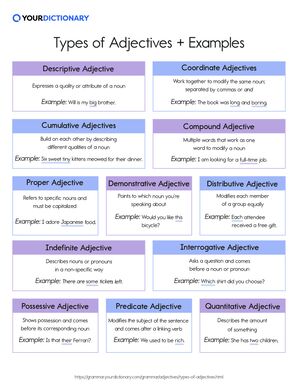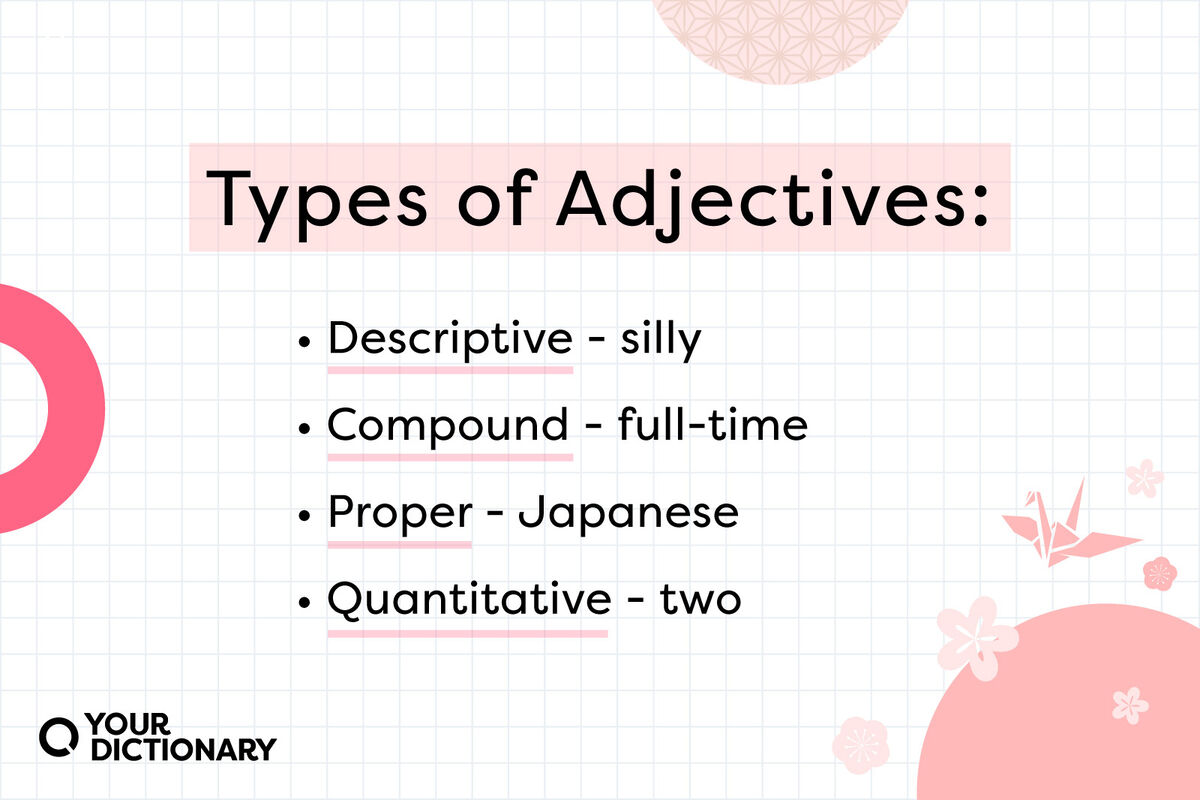

Adjectives turn clowns into funny clowns and cats into fluffy cats. But beyond clowns and cats, what can adjectives do? It all depends on the type of adjective you’re talking about — and there are more than you think.
What Do Adjectives Do?
Adjectives add descriptive language to your writing. Within a sentence, they have several important functions.
Adjectives can:
- modify nouns and pronouns
- act as complements
- ask questions
- answer questions
- show possession
- specify which noun you’re talking about
- compare nouns
- express states of being
Choosing the correct type of adjective can improve your writing and interest your readers. To do so, you need to know what each kind of adjective does in a sentence. This printable adjectives chart will serve as a reminder whenever you need a little help.

1. Descriptive Adjectives
Descriptive adjectives express a quality or attribute of a noun.
- We enjoyed a peaceful afternoon.
- She’s such a competent cashier.
- The silly dog rolled around in the filthy mud for hours.
- Will is my big brother.
2. Coordinate Adjectives
Coordinate adjectives work together to modify the same noun. They’re separated by the word and or separated with commas.
Using a phrase with multiple adjectives to modify the same noun can create an adjective phrase.
- She wore a pink and yellow top yesterday.
- It was a bright, sunny, and glorious morning along Tybee Beach.
- The book was long and boring.
- These pajamas are cute, comfortable, and affordable.
3. Cumulative Adjectives
Like coordinate adjectives, cumulative adjectives work together to modify a noun. But they build on each other by describing different qualities of a noun — and unlike coordinate adjectives, they don’t require commas or and between each one.
- Six sweet tiny kittens meowed for their dinner.
- Mario bought a beautiful red Suzuki motorcycle.
- Do you want this old plastic clock anymore?
- Let’s avoid those two annoying bullies.
4. Compound Adjectives
A compound adjective is made up of multiple words that work as one word to modify a noun. They are typically hyphenated, but not always.
- We are taking a five-hour cruise.
- I am looking for a full-time job.
- This is a foolproof plan.
- They bought some fat-free cheese.
5. Proper Adjectives
Proper adjectives refer to specific nouns. Like proper nouns, they must be capitalized.
- I adore Japanese food.
- She’s going to a Shakespearean festival.
- Can you buy more Christmas decorations?
- These fossils are from the Jurassic period.
6. Demonstrative Adjectives
Demonstrative adjectives point to which noun or pronoun you’re speaking about. There are four demonstrative adjectives in the English language: this, that, these, and those.
- Would you like this bicycle?
- That car used to be mine.
- I don’t want these accolades.
- Those shoes are gorgeous.
7. Distributive Adjectives
Distributive adjectives, such as any, each, either, every, and neither, modify each member of a group equally.
- Did any of you do your homework?
- Each attendee received a free gift.
- Either sweater will look great with those pants.
- She bought every handbag in that store.
- Neither doctor called me back.
8. Indefinite Adjectives
Indefinite adjectives describe nouns or pronouns in a non-specific way. The indefinite adjectives include few, many, no, several, and some.
- Few people get this far.
- Do you have many openings?
- There are no books in this library.
- I reviewed several sources.
- There are some tickets left.
9. Interrogative Adjectives
Interrogative adjectives, which include what, which and whose, ask a question. They come right before a noun or pronoun.
- What color do you want to paint the cottage?
- Which shirt did you choose?
- Whose land are we standing on?
10. Possessive Adjectives
Possessive adjectives show possession. Possessive adjectives come before their corresponding nouns.
- Is that their Ferrari?
- I didn’t know this was your hamburger.
- Please bring me my bill.
- The bird began to build its nest.
11. Predicate Adjectives
Adjectives that appear after the linking verb and modify the subject of the sentence are known as predicate adjectives. They’re also called subject or object complements.
- Vanessa is smart.
- We used to be rich.
- Those squirrels can be silly.
- The math homework seems tricky.
12. Quantitative Adjectives
Quantitative adjectives describe the amount of something. They can be numbers or other adjectives, and they answer questions like “How much?” or “How many?”
Unlike indefinite adjectives, quantitative adjectives are clear about the amount of something.
- She has two children.
- In the near future, I hope to own six puppies.
- In fact, I’ll take the whole litter.
- Forty people showed up at the party.
Can Articles Be Adjectives?
There are three articles (a, an, the) in the English language. They come before a noun to specify which noun you’re talking about — just like adjectives.
That’s why articles are considered a special class of adjectives.
- I just adopted a dog.
- This is an elephant.
- Don’t take away the iguana.
Types of Adjectives Quiz
Become agile with your adjectives with a quick quiz. Can you name the types of adjectives that are bolded in each sentence?
- Have either of you seen my bracelet?
- Natalie’s dress is gorgeous.
- Which dog is yours?
- We have four children.
- My boyfriend lives in Kansas.
- Lola asked several questions about the job.
- Our neighbors invited us over for Indian food and cake.
- You’re a wonderful, considerate, gentle-hearted friend.
- That music is too loud.
- There’s an enormous old abandoned warehouse we can practice in.
Types of Adjectives Quiz Answer Key
Check out the answers to the adjectives quiz to see if you understand all the types.
- Have either of you seen my bracelet? (Distributive adjective)
- Natalie’s dress is gorgeous. (Descriptive adjective and/or predicate adjective)
- Which dog is yours? (Interrogative adjective)
- We have four children. (Quantitative adjective)
- My boyfriend lives in Kansas. (Possessive adjective)
- Lola asked several questions about the job. (Indefinite adjective)
- Our neighbors invited us over for Indian food and cake. (Proper adjective)
- You’re a wonderful, considerate, gentle-hearted friend. (Coordinate adjectives and/or descriptive adjectives)
- That music is too loud. (Demonstrative adjective)
- There’s an enormous old abandoned warehouse we can practice in. (Cumulative adjectives and/or descriptive adjectives)